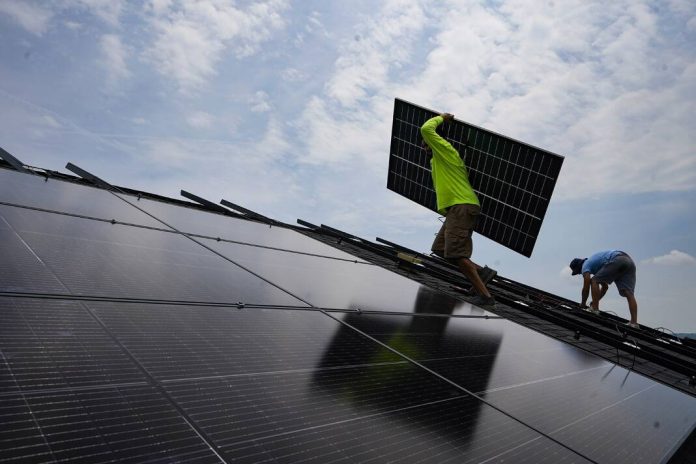
Nicholas Hartnett, owner of Pure Power Solar, carries a panel as he and Brian Hoeppner, right, install a solar array on the roof of a home in Frankfort, Ky., on July 17, 2023. (AP Photo/Michael Conroy, File)
Hundreds of low-income households in Columbus will benefit from a surge of millions of dollars of investment in solar power as a result of a federal grant that was announced Monday.
The Indiana Community Action Association, Inc. on Monday was awarded nearly $117.5 million through the Solar for All Indiana (SFAI) initiative. The funding comes from $7 billion appropriated nationwide through the Inflation Reduction Act’s Greenhouse Gas Reduction Fund. Columbus-based Energy Matters Community Coalition is part of the grant and hopes to receive upwards of $7 million for local solar installations.
Energy Matters board member Mike Mullett said Columbus has several projects that are positioned to move forward under the grant as early as July. The grant will fund projects around the state over a five-year period.
Mullett said 520 low-income households in the Lincoln Central Neighborhood and in East Columbus will benefit from a multifaceted program. The proposal includes a large installation of solar power panels at the Bartholomew County United Way Center, 1531 13th St., which will result in at least 20% reductions in electric bills for 320 households that will be enrolled.
Additionally, 200 households — either single-family or multi-family residences — also will receive rooftop solar panels.
The program, Mullett said, proves that “irrespective of a household’s income, irrespective of geographic location … it is possible to provide that household with access to free, affordable solar electric power.”
Mullett on Monday said “thank you, thank you, thank you” to partners including United Way, the city of Columbus, Duke Energy, neighborhood groups, local business leaders and others who have been involved in helping to design “shovel-ready” programs for Columbus. He hopes some of those can begin moving toward formal requests for proposals in July, when grant funds are expected to be available. The grant projects are formally known as the Columbus Community Solar for All Demonstration Program.
The EPA says SFAI’s statewide project “will collectively solarize low-income homes while transforming the market in Indiana by creating new financial products and incentives that jumpstart solar for low-income residents, new affordable housing developments, and more. In dialogue with utility companies, and in tandem with school-to-work industry development efforts, the coalition is committed to leading toward solar in Indiana from the grassroots upward.”
Indiana Solar United Neighbors Program Director Zach Schalk said, “The sun shines everywhere, but historically not everyone has been able to benefit from solar energy. Solar for All offers an unprecedented opportunity to equitably expand access to the benefits of local solar energy to more Hoosiers than ever before. This investment will empower families around the state to save money and take control of where their energy comes from.”
The coalition is led by the Indiana Community Action Association, along with Energy Matters, also includes Black Sun Light Sustainability in partnership with Indiana State Conference of the NAACP, the Indiana Energy Independence Fund, Faith in Place, Solar United Neighbors of Indiana, Earth Charter Indiana, and the cities of Fort Wayne, Gary, and Indianapolis.
SFAI was one of 113 nonprofits that sought funding through the program. The Solar for All funds will not only provide an essential reduction in greenhouse gas emissions, but also energy resilience, improved air quality, new jobs in the growing green technology sector, and home energy savings for struggling Hoosiers. Several projects by the Indiana coalition will also be new community solar installations. Community solar is a necessary tool for providing clean energy access to multifamily housing, renters, and those without ideal rooftop spaces.
Mullett said the program was remarkable for the diversity of stakeholders involved in planning as well as the technical expertise that got Columbus projects funded in what he said was among the most complex and competitive grant environments he’s seen in a long career.
“If we were good enough to get that far, I think we’re good enough to get the rest of the way home,” he said. The grant award shows, he said, “Whenever we get together and put our shoulder to the wheel, just what we can get done.”




